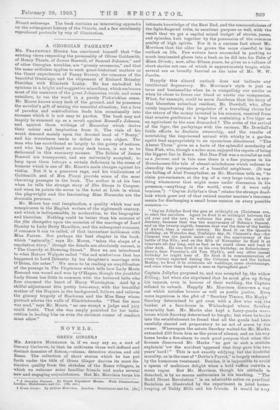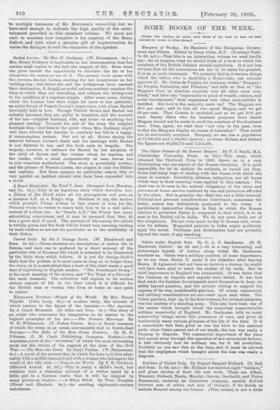NOVELS.
GREEN GINGER-1'
MR. Anuron lionnisoN i8, if we may say so, a sort of literary Cerberus, in that be cultivates three well-defined and distinct domains of fiction,---alums, detective stories, and old Essex. The collection of short stories which he has put forth under the title of Green Ginger derives its most dis- tinctive quality from the sketches of the Essex villagers, in which we welcome some familiar friends and make several new and engaging acquaintances. But Mr. Morrison turns his * A Georgian Pageant. By Frank Frankfort Moore. With Illustrations. London: Hutchinson and Co. [His. net.]
t aim Ginger. By Arthur Morrison. London Hutchinson and Co. [X] intimate knowledge of the East End, and the resourcefulness of the light-fingered tribe, to excellent purpose as well, with the result that we get a capital mixed budget of stories, yarns, and episodes, knit together by the possession of the common quality of high spirits. For it is a curious fact about Mr.
Morrison that the older he grows the more cheerful is his outlook on life. Few writers have succeeded in packing so much inspissated gloom into a book as he did into his Tales of Mean Streets ; now, after fifteen years, be gives us a volume of abort stories not one of which is approximately tragic, while several are as broadly farcical as the tales of Mr. W. W. Jacobs.
Happily this altered outlook does not indicate any intellectual degeneracy. Mr. Morrison's style is just as terse and businesslike when Ile is compelling our smiles as when lie chose to freeze our blood or excite our compassion.
What, for example, could be more Jacobean than the story of that blameless suburban resident, Mr. Dowdall, who, after vainly importuning the proprietor of a travelling circus for the return of the money invested in his concern, received from that evasive gentleman a huge box containing a live tiger us an equivalent to the sum demanded ? The scene of the arrival of the tiger, the parleyings with the carman, Mr. Dowdall's futile efforts to disclaim ownership, and the results of nourishing the imprisoned animal with whisky in a garden squirt lead appropriately to an uproarious denoiment. " The Absent Three" gives us a taste of the splendid mendacity of
Dan Fisk, who, though a sober man, enjoyed the repute of being the biggest liar in Essex. But Dan Fisk was a moralist as well
as a farceur, and in this case there is a fine purpose in his Munchausen-like tale of absent-mindedness which reduces to absurdity the pretensions of a boastful neighbour. (It was the failing of Abel Pennyfather, as Mr. Morrison tells us, "to
claim pre-eminence, at the top of a very large voice, in any- thing whatsoever that might come under discussion in his
presence,—anything in the world, even if it were only bunions.") " Cap'en Jollyfax's Gun" relates the strange dead- lock which grew out of that retired master mariner's innocent mania for discharging a small brass cannon on every possible occasion !--
" Cap'en Jollyfax fired the gun at midnight on Christmas eve, to start the carollers. Again he fired it at midnight between the old year and the new, to welcome the year ; on the ninth df January, because that was the anniversary of Nelson's funeral, and on the twenty-eighth, because that was the date of the battle of Aliwal, then a recent victory. He fired it on the Queen's birthday, on Waterloo day, Trafalgar day, St. Clement's clay—‘for Clement was the parish saint—and on the anniversary of the battle of the Nile; and on the fifth of November he fired it at intervals all day long, and as fast as he could clean and load it after dark. Ho also fired it on his own birthday, on Roboshobery Dove's, Sam Prentice'e, old Tom Blyth's, and any other casual birthday he might hear of. He fired it in commemoration of every victory reported during the Crimean war and the Indian Mutiny, he fired it to celebrate all weddings, some christenings, and once when they hanged a man at Springfield gaol."
Captain Jollyfax proposed to, and was accepted by, the widow Billing; but when she stipulated that he must give up firing his cannon, even in honour of their wedding, the Captain refused to submit. Happily Mr. Morrison discovers a wily out which satisfies honour us well as poetic justice. Even more ingenious is the plot of "Snorkey Timms, His Marks." Snorkey determined to get even with a Jew who was the banker at a faro-house in Whitechapel where Snorlcey invariably lost. Mr. Marks also kept a fancy-goods Wil re" house which Snorkey determined to burgle; but when he brolce into the establishment lie found that all the goods had been carefully cleared out preparatory to an act of arson by the owner. Whereupon the astute Snorkey waited for Mr. Marks, extracted £50 from him as the price of silence, and on his way home broke a fire-alarm to such good purpose that when the firemen discovered Mr. Marks "he got in sich a muddle explainin"ow the accident 'appened that they gave him two years' hard!" This is not exactly edifying, but the doubtful morality, as in the case of "Dobbs's Parrot," is largely redeemed by the humorous treatment. Besides, it is impossible to avoid
a spasm of malicious delight when a bold ruffian outwits a mean rogue. But Mr. Morrison, though , his attitude is detached, is by no means antinomian in his teaching. " The Rodd Street Revolution" is an admirable satire on practical Socialism as illustrated by the experiment in joint house- keeping of Teddy Mills and his friends. It would be els)!
'to multiply instances of Mr. Morrison's versatility, but we have said enough to indicate the high quality of the enter- tainment provided in this excellent volume. We must not omit to mention how complete is his mastery of the Essex dialect, and with what a genuine gift of impersonation he varies the dialogue to suit the character of the speaker.











































 Previous page
Previous page